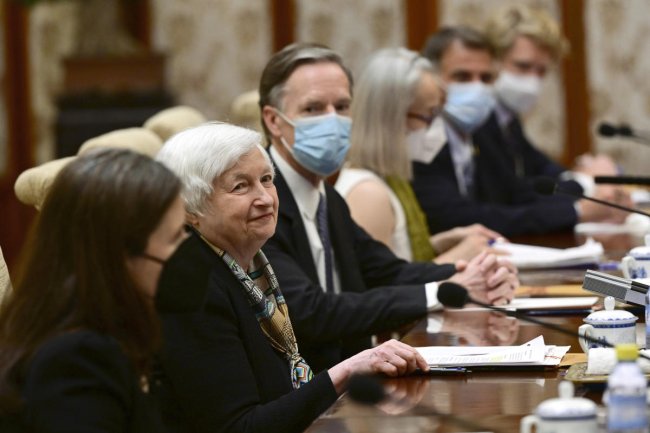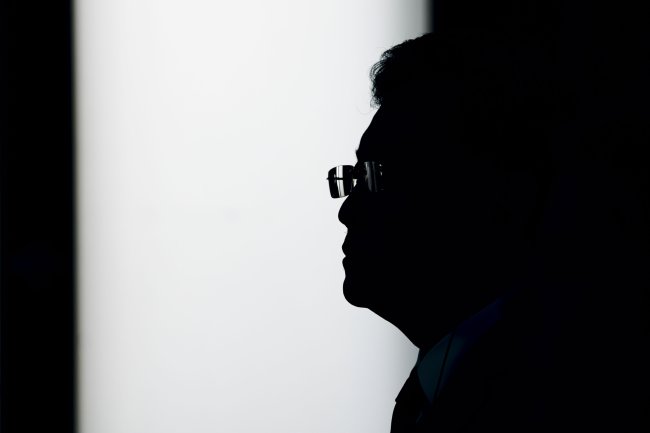Russia’s Combative Negotiating Style to Test U.S. in Detainee Talks
Wall Street Journal reporter Evan Gershkovich and U.S. Ambassador Lynne Tracy attend a court hearing in Moscow. Photo: Sergei Bobylev/Zuma Press By Daniel Michaels and Louise Radnofsky April 29, 2023 5:30 am ET Russia’s hard-nosed negotiating style, forged in the country’s tumultuous past, could prove a stiff challenge to the U.S. during any talks between Washington and Moscow to free detained Wall Street Journal reporter Evan Gershkovich. Russians can be unrelenting negotiators, often uncomfortable with a Western win-win approach and willing to put counterparts off balance, say people experienced in business and diplomacy in the country. The practices, they say, developed in response to decades of shortages under co


Wall Street Journal reporter Evan Gershkovich and U.S. Ambassador Lynne Tracy attend a court hearing in Moscow.
Photo: Sergei Bobylev/Zuma Press
Russia’s hard-nosed negotiating style, forged in the country’s tumultuous past, could prove a stiff challenge to the U.S. during any talks between Washington and Moscow to free detained Wall Street Journal reporter Evan Gershkovich.
Russians can be unrelenting negotiators, often uncomfortable with a Western win-win approach and willing to put counterparts off balance, say people experienced in business and diplomacy in the country.
The practices, they say, developed in response to decades of shortages under communism and the chaotic economic transition since then, were built on an absolutist tradition running from Russia’s czarist past through the Soviet Union to President Vladimir Putin’s authoritarian rule.
It is also important to Russia, a world power, that it be treated as an evenly matched adversary, striking a deal that can be portrayed at home as balanced.
Russians, meanwhile, often accuse Western counterparts of arrogance and hypocrisy in dealing with them.
Read Evan Gershkovich’s Work
- A sampling of the WSJ reporter’s coverage of Putin’s Russia and a country at war
Veterans of negotiations with Russian counterparts declined to speculate on the course of talks over Mr. Gershkovich because his case is so unusual and high-profile. The 31-year-old reporter was detained on March 29 by Russia’s Federal Security Service, or FSB, while he was on a reporting trip in the city of Yekaterinburg and held on an allegation of espionage that the Journal and the U.S. government vehemently deny.
Conviction carries a prison sentence of up to 20 years. It is rare for a court to acquit a defendant.
Western governments and global news organizations have joined the Journal and the U.S. administration in demanding the journalist’s immediate release.
Russia has said that it is acting in accordance with its own laws.
The State Department has officially classified Mr. Gershkovich as “wrongfully detained” and President Biden called his detention “totally illegal.”
Mr. Gershkovich is the first U.S. journalist to have been arrested on an espionage allegation in Russia since the Cold War, so there is no recent precedent for his situation. But in the dynamics of Mr. Gershkovich’s detention, longtime Russia observers see familiar elements, such as escalation and attempts at intimidation. It comes as Russia is already holding another American, Paul Whelan, in what the U.S. considers a wrongful detention. He was convicted of espionage in 2020.

Brittney Griner, in red, at a court hearing in Russia. Talks between Russia and the U.S. over her release spanned months.
Photo: Alexander Zemlianichenko/Associated Press
Russia has recently tightened secrecy laws, but Mr. Gershkovich was charged with gathering information that constituted a state secret, a particularly serious charge. Russia last year leveled weighty drug-possession charges against U.S. basketball star Brittney Griner and, before her, Israeli-American Naama Issachar, both of whom were caught with small amounts of cannabis derivatives. The infractions might have drawn lesser charges for a Russian citizen or if prosecutors chose not to pursue them as vigorously, say people familiar with Russia’s legal system.
Moty Cristal, chief executive of Nest, a negotiation-strategy consulting firm in Tel Aviv, said he sees Russia as trying to gain an edge by quickly going to an extreme position.
“In Russia, it is 100% legitimate to arrest a basketball player, an innocent girl or a journalist,” said Mr. Cristal, who taught negotiating tactics at Skolkovo Business School in Moscow.
A personal, guided tour to the best scoops and stories every day in The Wall Street Journal.
Subscribe Now“In the West, you’re applauded if you achieve a win-win,” he said. “In Russia, winning—by definition—means defeating the other side.”
Serious negotiations over Mr. Gershkovich can only begin after he has faced trial, Russian Deputy Foreign Minister Sergey Ryabkov has said. Russian officials often say their legal system operates independently and needs to be respected.
Following the finding of wrongful detention, the U.S. government’s special presidential envoy for hostage affairs, Roger D. Carstens, is handling the case. His team will face Russian negotiators who are likely to say that they are discussing a case involving state secrets and arranging a potential spy swap—a divergence in perspective that could further complicate talks.
The two sides have also struggled to reach an agreement over Mr. Whelan, a corporate security executive from Michigan who has been held since late 2018.
In Ms. Griner’s case, the charges against her were less loaded, although her celebrity status introduced other complications. Talks over her release spanned months, during which Russian officials frequently accused the U.S. of failing to respect Russia’s justice system, and railed against U.S. “megaphone diplomacy” when American officials tried to press Moscow publicly.
Russian officials at times also challenged U.S. statements about Washington’s efforts on behalf of the U.S. citizens, suggesting at one stage that embassy officials hadn’t attempted to visit Ms. Griner in person, even though they had.
Some U.S. people who followed the talks also suspected that Russia was dragging out the process to run past November’s midterm elections and deny Mr. Biden and Democrats any electoral boost from her release. Almost immediately after, it appeared as if Moscow could be seeking to up the pressure on Washington by moving Ms. Griner to a penal colony to begin serving her nine-year sentence.
By early December, the U.S. and Russia completed an agreement to release Ms. Griner in exchange for the U.S. freeing Viktor Bout, a high-profile Russian businessman the U.S. had convicted of arms trafficking.

Illustration: Todd Johnson
During the Cold War, detainee swaps—usually for spies—followed set patterns, working through diplomatic and intelligence channels. In formal international negotiations such as arms-control talks, Moscow usually followed accepted protocols, say U.S. diplomats.
Rose Gottemoeller, who was the chief U.S. negotiator on the New Start arms-control treaty with Moscow in 2009, said dealing with her Russian counterparts was generally predictable and businesslike, though some characteristics stood out.
“The Russians are famous in their skill at slow-rolling,” she said, citing a comment by Soviet Premier Nikita Khrushchev in the 1950s that he could tell his foreign minister to sit on a block of ice for as long as necessary for the other side to capitulate.
European Union officials spent years negotiating with Moscow to eliminate fees for airlines to cross Russian skies that Brussels deemed illegal, believing at least twice they had struck a deal. But as of last year, when the EU imposed sanctions on Russian aviation, the charges continued.
John Sullivan, a former U.S. ambassador to Russia, said last year that Moscow would delay visits to see detained U.S. citizens, even when permission had been granted in principle.
“We’re given a day and time to go to prison, then we arrive and then we’re told that, ‘Oh, well, we needed three stamps on our form and we’ve only got two,’ or ‘the signature needs to be in blue ink and this is in black ink,’ so you have to come back,” he said.
Some Russians reject broad characterizations of their negotiating style.
“Ten different ‘Russian businessmen’ will have exactly 10 different negotiating tactics and strategies. Both hard and soft, and 100% honest and not very honest,” said Yevgeny Bykov, a businessman from Yekaterinburg.
Many Russian businesspeople over recent decades did strive for a cooperative negotiating stance. Yet people experienced with Russia say history has colored its views on negotiations and instilled a winner-take-all perspective.
Josh Tulgan, an American who lived for more than 20 years in Russia, working in finance at a large Russian telecommunications company, continually felt pressure for each transaction to be a clear win for the group. “Every deal had to be better than the last one,” he said.
“There was seldom any interest in a win-win solution or room for compromise,” Mr. Tulgan said. “Control was so important because, without it, you could easily be the victim of the whims of your partners.”
He said that given repeated currency collapses and “the brutality of the post-Soviet business experience, perhaps Russians had nothing to suggest to them that a win-win solution was ever a preferable, let alone a viable, option.”

President Putin’s dog sits next to then-German Chancellor Angela Merkel in 2007.
Photo: AXEL SCHMIDT/Agence France-Presse/Getty Images
That tendency to offer no quarter in business has crept into Russian diplomacy over recent years, observers say.
When Mr. Putin hosted former German Chancellor Angela Merkel in 2007, he invited her to sit with him for a press briefing and then called for his black Labrador. Ms. Merkel, who is known to fear dogs, looked visibly uncomfortable.
During a visit to Moscow in 2021, EU foreign-policy chief Josep Borrell learned via Twitter during a lunch meeting with Russian Foreign Minister Sergei Lavrov that Russia had expelled three European diplomats. That was shortly after Mr. Lavrov insulted Mr. Borrell at a press conference, calling the EU an “unreliable partner,” and accused European leaders of lying.
At a press conference early last year with the U.K.’s then-foreign secretary, Liz Truss, Mr. Lavrov said their earlier conversation had been between “the dumb and the deaf” and then exited the podium, leaving her standing alone.

Russian Foreign Minister Sergei Lavrov at a meeting with the U.K.’s then-foreign secretary, Liz Truss, in 2022.
Photo: Russian Foreign Ministry/Zuma Press
Russia’s increasingly unpredictable diplomacy—which some compare to Mr. Khrushchev brandishing his shoe at the United Nations General Assembly in 1960—coincides with a retreat from efforts to adopt Western-style business-negotiation tactics.
Mr. Cristal, who taught in Moscow as part of a post-Soviet effort to better integrate Russia into the global economy, said that until Russia’s invasion of Ukraine last year, “Russians understood that if they wanted to succeed in the world business arena, they had to change how they operate in business.”
In contrast to the Soviet tradition, “businesspeople conducted very successful cooperative business negotiations,” Mr. Cristal said.
Now, sanctions imposed due to the war have cut Russia off from more developed parts of the global economy, particularly those such as the U.S. and Europe that favor more cooperative negotiations.
—Matthew Luxmoore, Ann M. Simmons and Thomas Grove contributed to this article.
Write to Daniel Michaels at [email protected] and Louise Radnofsky at [email protected]


What's Your Reaction?

















